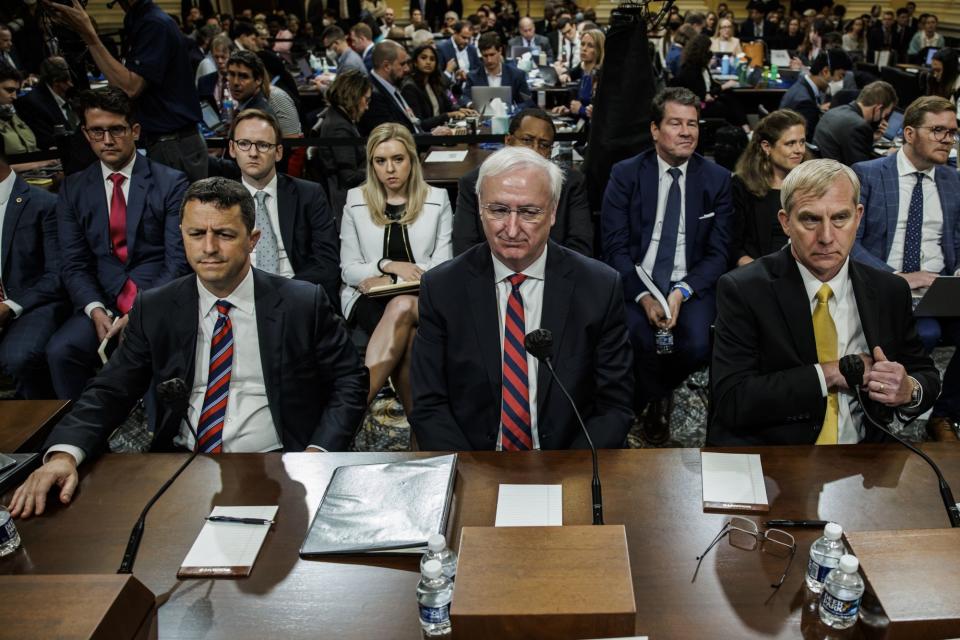‘Pure Insanity’: Trump Election Fraud Pursuit Detailed by Panel

(Bloomberg) -- Then-President Donald Trump spent the weeks before Jan. 6, 2021, flailing for ways to get the Justice Department to bolster false claims of election fraud, badgering his acting attorney general on a near-daily basis and attempting to replace him when he refused to comply.
Most Read from Bloomberg
Supreme Court Overturns Roe, Transforming Abortion-Rights Fight
‘Coast to Coast’ Housing Correction Is Coming, Says Moody’s Chief Economist
Three former top Trump Justice Department officials including the acting attorney general, Jeffrey Rosen, testified Thursday to a relentless pressure campaign that veered into unsubstantiated conspiracy theories one of them described as “pure insanity.” The effort culminated in a heated Oval Office confrontation in which senior department leaders threatened a mass resignation.
The hearing by the House panel investigating the Capitol insurrection also included video testimony from White House officials revealing Republican members of Congress lobbied for presidential pardons to protect them from criminal prosecution for their involvement in efforts to overturn the election.
Representatives Matt Gaetz, Scott Perry, Andy Biggs, Louie Gohmert and Mo Brooks all contacted White House staffers seeking pardons for themselves or others, according to the testimony.
GOP Lawmakers Sought Pardons After Election, Jan. 6 Panel Told
The panel presented Trump’s push for the Justice Department to go along with his voter fraud claims as integral to his efforts to get Republican-controlled legislatures to substitute pro-Trump electors in battleground states Joe Biden won, by providing a pretext for Trump’s allies to act.
Trump seemed to suggest as much in a Dec. 27 phone call with Rosen and Richard Donoghue, according to testimony from Donoghue, who was then the acting deputy attorney general.
“What I’m just asking you to do is say it was corrupt and just leave the rest up to me and the Republican congressmen,” Donoghue said, reading what he said was an “exact quote” he wrote down in notes he took during the conversation.
Representative Bennie Thompson, the panel’s chairman, said Trump engaged in “a brazen attempt to use the Justice Department to advance the president’s personal political agenda.”
Key parts of Trump’s campaign to pressure DOJ were disclosed in a Senate report last October. But the panel presented an expanded picture, along with new evidence of connections between the maneuvering at the Justice Department and John Eastman, a private Trump attorney seeking appointment of alternate electors.
Jeffrey Clark, a Trump assistant attorney general who normally worked in environmental law, emerged as a key figure in Trump’s final attempts to press the Justice Department. Clark urged Rosen and Donoghue to send letters to battleground state legislatures saying the department was investigating “various irregularities” in the election and suggesting they consider alternate electors.
After Rosen and Donoghue refused to go along with the letter or other requests to amplify claims of election fraud, Trump decided to appoint Clark acting attorney general on Jan. 3. That provoked Rosen and Donoghue to rush to the White House for the Oval Office showdown, after securing commitments from most of the department’s senior leaders to resign if Trump went through with the appointment. The meeting was so rushed that Donoghue came straight to the White House in muddy boots, jeans and an army T-shirt, he said.
Trump seemed shaken and backed off after White House Counsel Pat Cipollone, who also threatened to resign, warned that proceeding would be “a murder-suicide pact,” Donoghue said.

 Yahoo Autos
Yahoo Autos 
